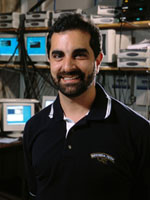Research Interests
Check out the Ubiquitous Computing Research Group's Web site. This details information about the students I directly supervise within the College of Computing. Here is an overview of my current research, updated much less frequently. This will give you an idea of what I have been doing at Georgia Tech in the area of Software Engineering and Human-Computer Interaction applied to ubiquitous computing and software architectures. This is also available in PDF format. These links include references to much of my recent publications. A complete bibliography can be found in my curriculum vitae, available only in PDF format. This c.v. is in a Georgia Tech defined format, so there might be details there you won't be interested in.
My main research interests lie in the intersection between Software Engineering and Human-Computer Interaction. Specifically, I have been working on the following themes:
- Ubiquitous Computing for Future computing environments
- I lead a research group, the Future Computing Environments Group. The FCE Group mission is to invent and better understand what constitutes an effective, everyday partnership between humans and technology. In April 1995, I co-founded the FCE Group with Chris Atkeson. Today, the FCE Group is recognized nationally and internationally as a premier research group in ubiquitous computing. Our reputation has directly resulted in a growth in associated faculty and research breadth and depth. There are now seven full-time faculty (Abowd, Atkeson, Aaron Bobick, Irfan Essa, Blair MacIntyre, Elizabeth Mynatt & Thad Starner) in the FCE Group, with over 20 PhD students and numerous masters and undergraduates. In addition to pushing a strong experimental research agenda in various subdisciplines of Computer Science, the FCE Group fosters a culture of excellence in the development of living laboratories for research.investigating and building futuristic computing applications that apply ubiquitous computing technology to everyday life situations, such as education, tourism and the home.
- Software architecture
- As a result of two years postdoctoral experience at Carnegie Mellon, I have been working on models to specify and evaluate software architectures. This work has produced a formal framework for defining architectural styles and a process for performing scenario-based architectural evaluations. The evaluation work is part of a continuing research effort with colleagues at the Software Engineering Institute. I am also working with colleagues here at Georgia Tech on a DARPA-sponsored project, MORALE with a large software architecture emphasis.
- Formal methods in HCI
- Development of formal specification languages to support description and analysis of interactive systems. This was the principal focus of my doctoral thesis and postdoctoral research at the University of York. It is no longer a mainstream focus in my research, but I have recently done some work on applications of model checking to dialogue specification and verification.
Research Projects
Much of our work is situated in existing everyday settings, such as the classroom (see eClass), the office (see the TeamSpace project and the Augmented Office by others in the FCE Group) and the home (see Aware Home). There are some general themes to the research, listed below.
- Automated capture and access to live experiences
- CareLog, a capture and access application for care of children with autism in unstructured settings
- Abaris, a capture and access application supporting structured autism interventions
- INCA (INfrastructure for Capture and Access), a framework for developing applications that support automated capture and access
- TeamSpace, a distributed capture system for meetings.
- Tagger, a requirements capture tool for automatically tagging live knowledge acquisition interviews.
- The Personal Audio Loop
- eClass, formerly Classroom 2000. An environment to explore the impact of automated capture and access to live university lectures.
- StuPad: Integrating personal and private capture An important extension to Classroom 2000
- Context-Aware computing
- The ContextCam
- The Context Toolkit A framework for designing and evolving complex context-aware applications.
- Cyberguide A completed project on location-aware tour guides.
- Cyberdesk A completed project on automated integration of personal information management tools.
- Ubicomp in the home
- Family availability in the home
- The Family Video Archive
- The Aware Home Research Initiative A large project involving ubiquitous sensing, context-awareness, elder care and locating lost objects in a real home environment.
- The Smart Floor A completed project enabling the most natural of input devices to know who is there.
- Domisilica A completed project on the link between physical and virtual environments centered around the kitchen.
- Natural interaction for ubicomp
- Virtual Rear Projection
- Sound Source Localization
- Large-scale interactive surfaces, examining the use of front-projection technology and various input sensing techniques to create interactive walls.
- ERRATA A completed Support for effective error handling in recognition-based interaction, resulting in the Organized Option Pruning System (OOPS) toolkit, by Jennifer Mankoff.
- Software Architecture
|



